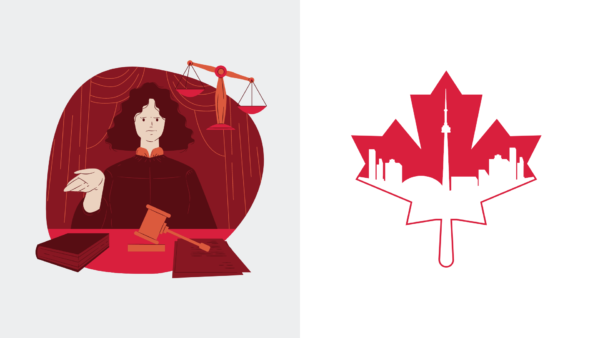Several major law schools in Canada provide great legal education and generate highly talented legal practitioners. These schools are well-known for their demanding academic programmes, prominent faculty, and dedication to legal research and practise excellence. Students interested in a career in law can benefit from these top law schools’ extensive curriculum, experiential learning opportunities, and different areas of specialisation.
Osgoode Hall Law School – York University (Toronto, Ontario):
Osgoode Hall Law School is one of Canada’s oldest and most prestigious law schools. It offers a wide range of programs, including J.D., LL.M., and Ph.D. programs. Osgoode Hall is known for its strong faculty, diverse curriculum, and extensive experiential learning opportunities.
Faculty of Law – University of Toronto (Toronto, Ontario):
The Faculty of Law at the University of Toronto is consistently ranked among the top law schools in Canada and worldwide. It offers a rigorous J.D. program and a vibrant research community. The faculty is renowned for its interdisciplinary approach to legal education and its focus on public interest law.
Faculty of Law – McGill University (Montreal, Quebec):
The Faculty of Law at McGill University is one of the oldest law schools in Canada and is recognized internationally for its excellence in legal education and research. It offers a bilingual J.D. program and an LL.M. program with various specializations. McGill Law School has a strong emphasis on legal theory and comparative law.
Peter A. Allard School of Law – University of British Columbia (Vancouver, British Columbia):
The Allard School of Law at the University of British Columbia is known for its innovative programs and commitment to social justice. It offers a comprehensive J.D. program, LL.M. degrees, and a Ph.D. program. The school places a strong emphasis on experiential learning and offers clinics, internships, and global exchange opportunities.
Faculty of Law – University of Alberta (Edmonton, Alberta):
The Faculty of Law at the University of Alberta is a leading law school known for its strong faculty and collaborative learning environment. It offers a J.D. program, LL.M. degrees, and a Ph.D. program. The school focuses on interdisciplinary legal education and offers specialized programs in areas such as energy law and Indigenous law.
Faculty of Law – University of Ottawa (Ottawa, Ontario):
The Faculty of Law at the University of Ottawa is recognized for its bilingual programs and its location in the capital city of Canada. It offers a J.D. program, LL.M. degrees, and a Ph.D. program. The school is known for its expertise in areas such as constitutional law, human rights, and technology law.
Schulich School of Law – Dalhousie University (Halifax, Nova Scotia):
The Schulich School of Law at Dalhousie University has a rich history and offers a strong legal education. It provides a J.D. program, LL.M. degrees, and a Ph.D. program. The school is known for its focus on social justice, maritime law, and health law.
Faculty of Law – University of Calgary (Calgary, Alberta):
The Faculty of Law at the University of Calgary offers a dynamic legal education with a focus on experiential learning and interdisciplinary research. It provides a J.D. program, LL.M. degrees, and a Ph.D. program. The school is renowned for its strong connections to the legal profession and its innovative curriculum.
Faculty of Law – Queen’s University (Kingston, Ontario):
The Faculty of Law at Queen’s University offers a vibrant and rigorous legal education. It offers a J.D. program, LL.M. degrees, and a Ph.D. program. The school is known for its small class sizes, supportive community, and strong alumni network.
Bora Laskin Faculty of Law – Lakehead University (Thunder Bay, Ontario):
It’s located in Thunder Bay, Ontario, is a unique institution that offers a specialized legal education. The faculty is committed to providing students with a comprehensive understanding of the law and legal systems, with a particular focus on addressing the needs of Northern Ontario and Indigenous communities.
These top law colleges in Canada offer exceptional programs, faculty expertise, and opportunities for students to engage in experiential learning, research, and community involvement. Aspiring lawyers can find their ideal educational experience within these renowned institutions, positioning themselves for successful legal careers in Canada and beyond.

 Life6 years ago
Life6 years ago
 Life7 years ago
Life7 years ago
 Viral Stories5 years ago
Viral Stories5 years ago
 Places6 years ago
Places6 years ago
 Career5 years ago
Career5 years ago
 Places6 years ago
Places6 years ago
 Career2 years ago
Career2 years ago
 Career4 years ago
Career4 years ago




